It’s June 15th, 2025, and it’s Father’s Day Sunday. Today, I attended the March for Palestine here in Quito, Ecuador. I was nervous, to be honest. I kept thinking about everything I see on the internet, the aggression all around. I thought for sure we would encounter at least some sense of “danger,” whether it was a pickpocket, the police, or I don’t know; your mind just conjures up tons of stories. Let’s face it, once you start to understand—like really understand—what this quote we constantly see repeated says…
“Apartheid was legal. The Holocaust was legal. Slavery was legal. Colonialism was legal. Legality is a matter of power, not justice.” —Jose Antonio Vargas
It’s bone-chilling to see the Earth we currently live in.
The reality is, however much fear or danger I could possibly face today, it was going to be a fraction of what a Palestinian in Gaza experiences daily.
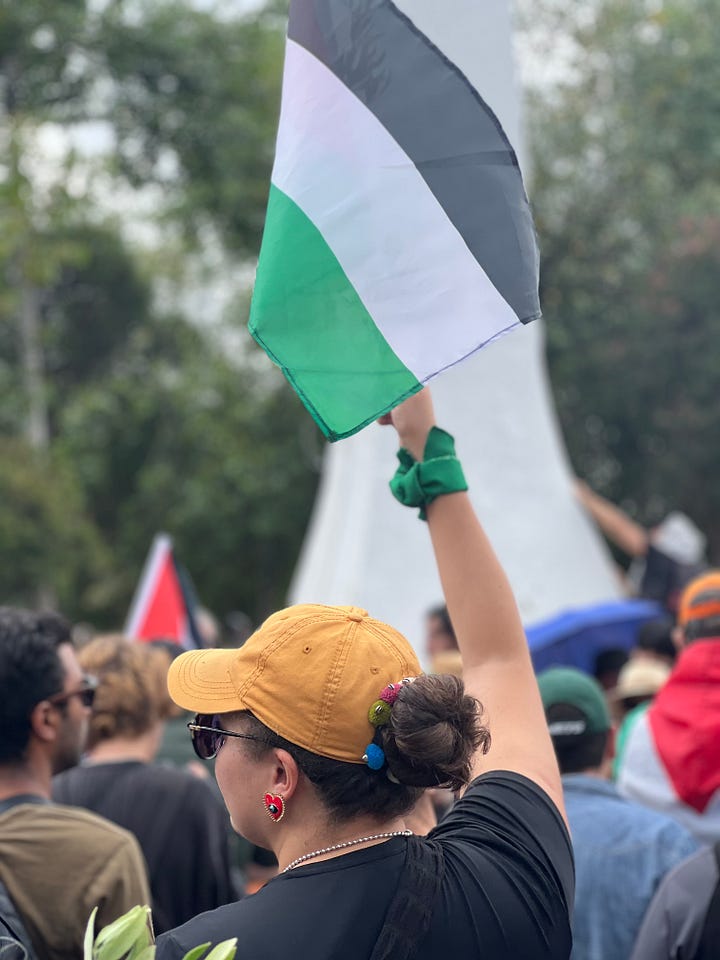
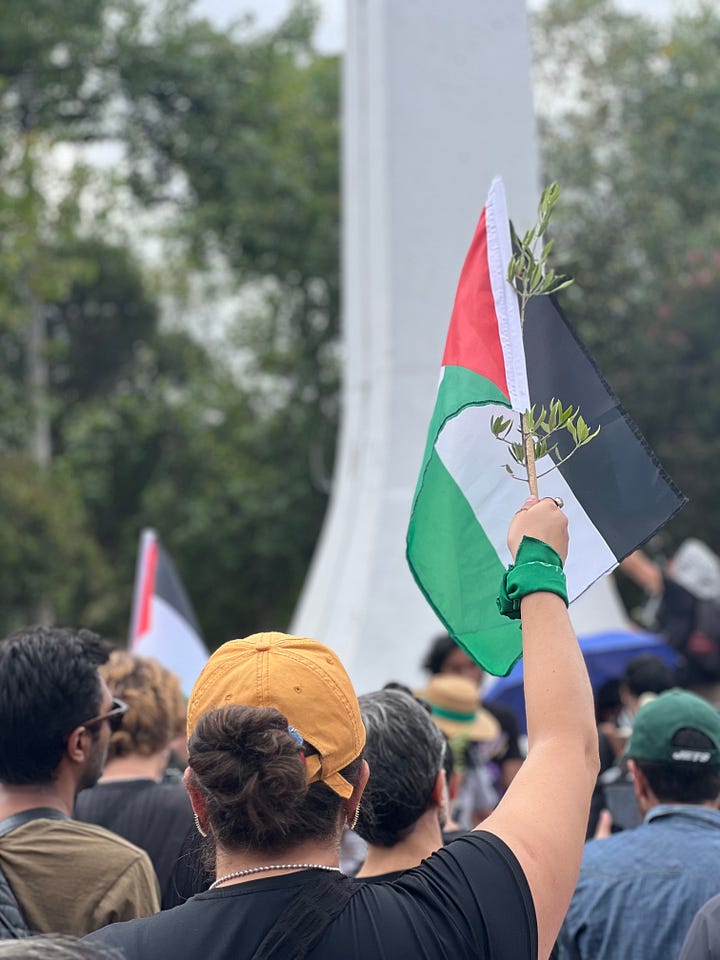
But what I encountered at the march was very different from all the stories I had made up in my head. What I encountered was love, empathy, chanting, dancing, singing, community open mic moments, and people coming together in solidarity—with empathy and love—taking time out of their Father’s Day morning to mourn, to honor all the parents who today won’t get to hug their children, and all the children who won’t get to hug their parents. What I encountered was the same Palestinian-Ecuadorian family I met at the first Palestinian gathering here in Quito back in March 2024. They shared their story that first time and gave me this Palestinian flag. They asked me to bring it to the next protest or for the time we celebrate a Free Palestine. I’ve cherished that flag ever since, not because of the borders, politics, or ideologies it may represent, but because of the humanity that stands behind a symbol like a flag.
I wave their flag today because I believe in humanity, in compassion, in not bombing our way through our problems, not killing, and not exterminating another human being just because you can’t see their humanity. How is a Palestinian child less valuable than an Ecuadorian one? Than a British one? How can we call ourselves feminists if we can’t show up for all living beings? That’s the whole point—to show up for other humans when they are being bullied, hurt, or killed. Even if it feels like going to a protest, listening to a song, or watching a movie can have little immediate impact in aiding human suffering in Occupied Palestine, from Gaza to the West Bank, it has so much impact. It means so much. The energy when we are all chanting, the energy when we are all in silence, the energy when the individual prayer becomes a collective one.
When we listen to a song by a Palestinian artist, when we watch a movie by Palestinian filmmakers, when we read books, when we ask questions, we keep them alive. We keep Palestinian culture, sentiment, and life alive. We can never stop telling stories and sharing stories. That is the only way their memories die, their stories die—when we stop uplifting Palestinian voices, Palestinian food, and Palestinian culture.
Today at the march, the same Palestinian-Ecuadorian family was there. I went up to them, to the daughter, and I thanked her for the flag she gave me a year ago. I thanked her because her story, the story of her dad—a Palestinian man who sought refuge in Ecuador in the 1970s and met an Ecuadorian woman and had an Ecuadorian daughter—is a story of resilience, of love, of bravery, of hearts. They brought olive branches to share with us all today. Delila, the daughter, then told us that the olive branches are from a tree her father planted here in their home in Quito. The seeds of this tree are from their olive tree in Ramallah, a tree whose roots are now in Ecuador, whose hearts and ancestors are from the other side of the world, an occupied land where their olive trees are destroyed, burned, uprooted—and the only reason for that is hate.
Today at the march, there were a couple of beautiful artistic performances. At that moment, I realized: That’s right, that’s why I went into art. Because this is where the heart is. The vulnerability, the love. Art can heal. Performance, music, poetry, painting, drawing... art, art, art. It heals. The performance was of these people—male, female, human—their heads and faces wrapped with scarves, some Keffiyehs, some black scarves. They were led by a person with palo santo and other sahumerios. They were all holding what looked like dead babies wrapped in white cloth. That image, that none of us can get out of our heads—the mothers and fathers holding their babies after a bombing, parts of their babies. Oh my God, I tremble as I remember that visual on my Instagram feed. I can’t even begin to imagine what it’s like in person, in skin, in blood. This performance was so impactful. They all walked through the crowd chanting a beautiful prayer. They then placed the burlap-wrapped “baby” on the ground and opened it to reveal a bunch of red roses inside. As they continued with their singing and praying, they gave each one of us a red rose. Petals were being thrown around, and the wall was lined with baby clothes. My heart, my body, the goosebumps—wow, was it powerful.


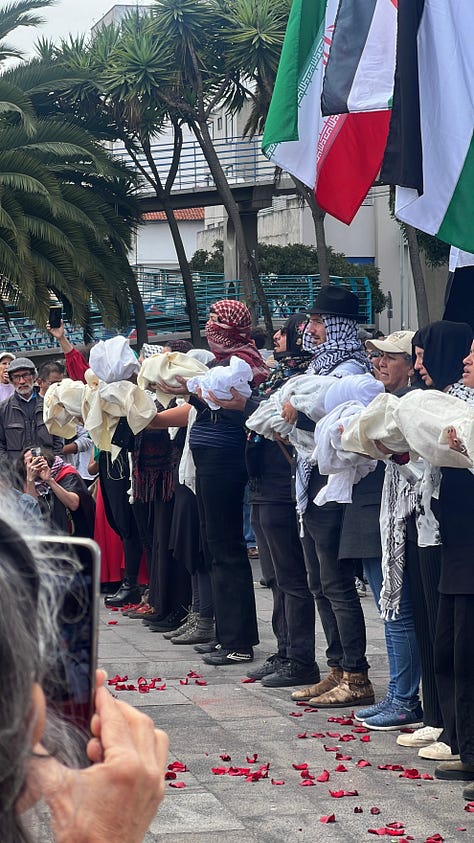



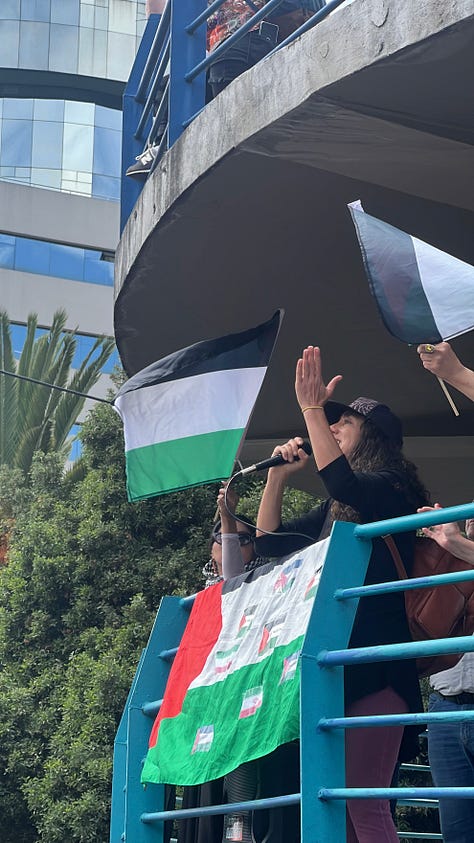

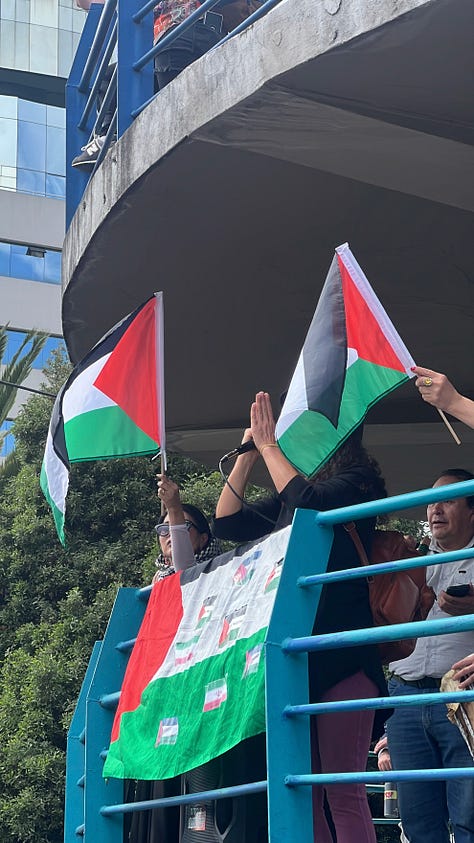
While we were marching, holding the Palestinian flag and helping hold a huge long flag with a bunch of other amazing humans, we were all chanting. As we passed a mall full of people, they all stared. We stopped by the McDonald's, and as we were there, all singing and chanting, I spotted a drone. I heard the drone get closer. That’s the moment I thought, wow, what a metaphor for the moment. A drone being used for marketing, propaganda—to create video content to support Palestine, to report on this march in Quito. And at the same time, somewhere in Palestine, there’s a kid, a teen, a mom, a dad, running away from a drone that is coming to unalive them. I couldn’t stop thinking about how metaphorical it was to feel the drone above me, here, knowing that it’s just a camera. The worst it can do is capture my bad angle. Wow, how can something so small mean so much? A drone in Quito is just a drone. A drone in Palestine is a death sentence.



If you have time, please take a look at the small video I’ve put together of today’s March For Gaza in Quito, Ecuador. I hope the energy of us all being together and showing up as a collective for a Free Palestine can help drive some of the good energy we are going to need to support, free, and rebuild all that has been destroyed in Palestine. I know that us marching will never bring back all those souls who have been taken from this Earth because of hate, but may our collective prayers reach all the hearts. May we continue to use our voices, our hearts, our empathy, our humanity—for others, for those who need it. Because right now, it’s for them. Tomorrow, it may be for us. Solidarity, Empathy, Humanity, Always.
Hate and war will never be the answer.
Hate and war will never be fertile.
Hate and war will never be.
May all beings know safety. May all beings know love. May all beings know freedom.
May all beings be free from suffering and the root of suffering.
May all beings know happiness and the root of happiness.
May all beings live in sympathetic joy, rejoicing in the happiness of others.
May all beings live in equanimity, free from passion, aggression, and delusion.
May all beings everywhere be happy and free,
and may the thoughts, words, and actions of my own life
contribute in some way to that happiness and to that freedom for all.
Written elsewhere, with love,
Estefi

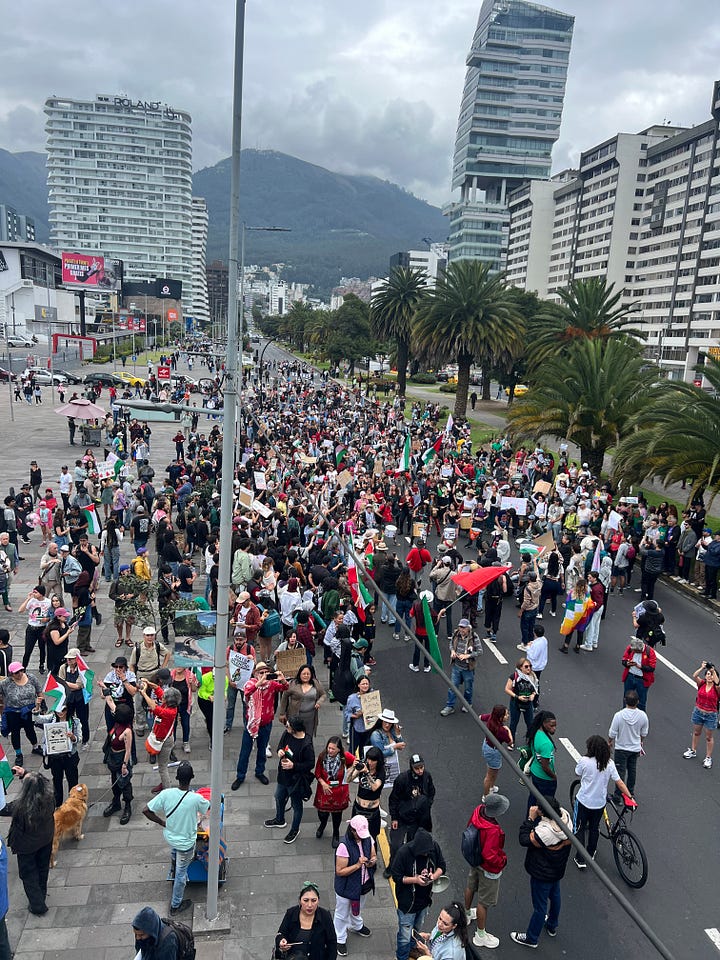
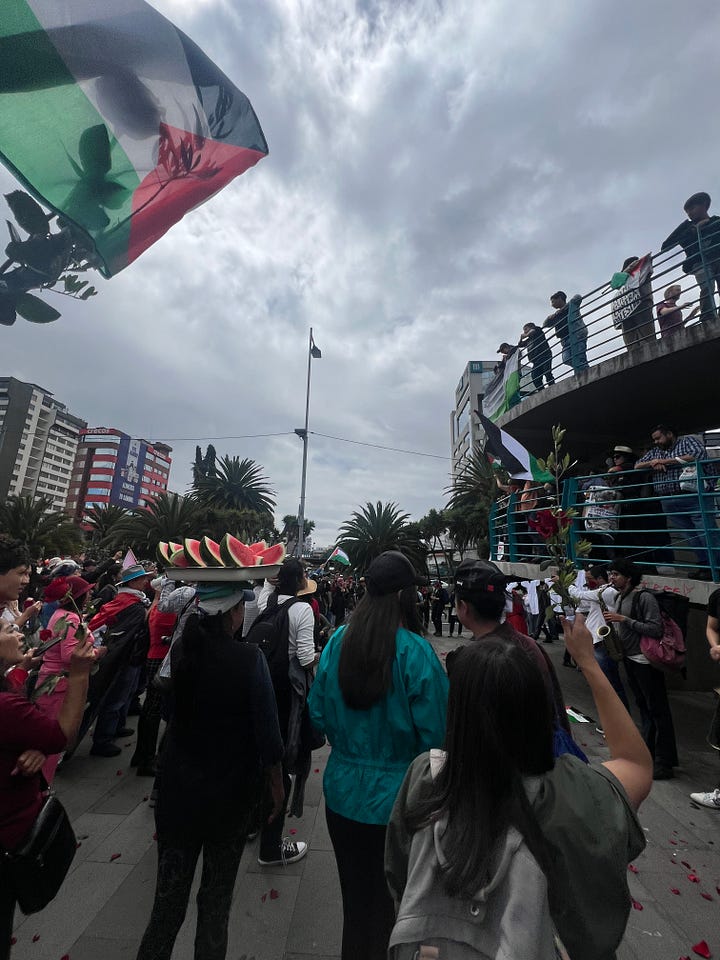
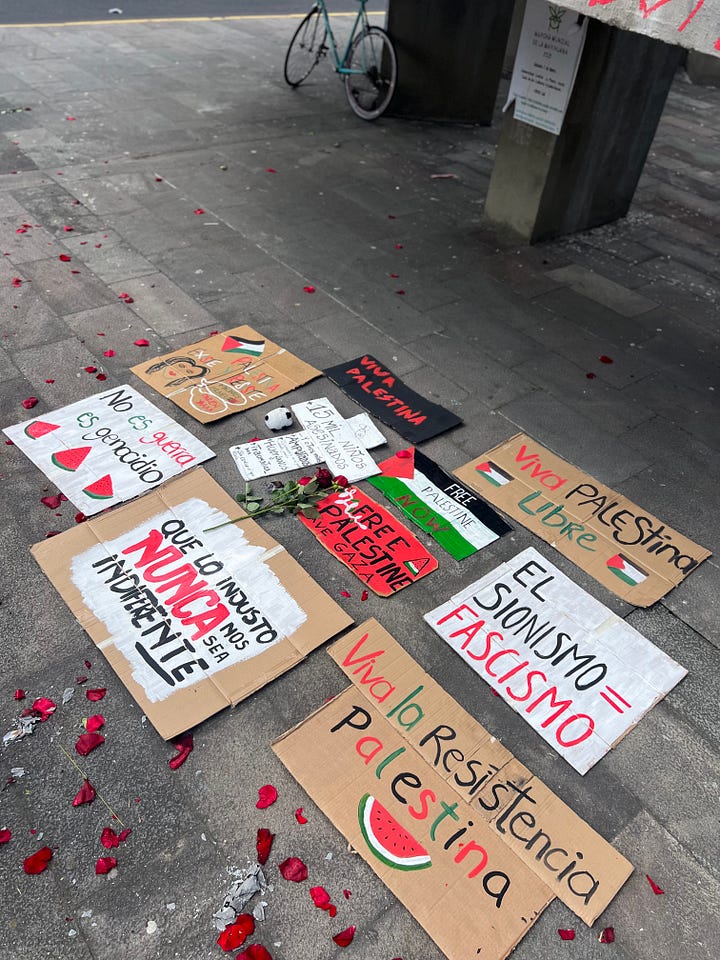
Listen to these two Palestinian Artists I love:
Nemahsis
Nemah Hasan, known professionally as Nemahsis, is a Palestinian-Canadian singer-songwriter from Toronto, Ontario. Her instagram. Her website.
Anees
Anees Mokhiber, known mononymously as Anees, is a Palestinian-American singer, rapper, and songwriter known for his hit song, "Sun and Moon", becoming the first international artist to top Billboard Philippines Songs chart. His instagram. His website.











Share this post